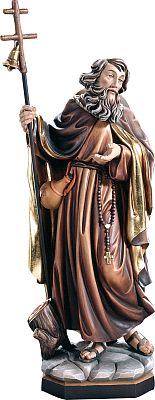
Feastday: August 30
Death: 1026
Benedictine missionary and abbot, a disciple of St. Romuald in Bologna, Italy. He was sent by Romuald to preach in Egypt and Syria. After this mission duty, Bononius became the abbot of the Benedictine abbey of Lucedo, in the Piedmont area of Italy.
| This article needs additional citations for verification. (June 2018) |
Saint Bononio (or Bononius) (died August 30, 1026) was a Benedictine abbot and saint of the Catholic Church.
Bononio was born in Bologna sometime in the latter part of the tenth century. He became a monk at an early age, and while on a pilgrimage to the East settled in Egypt to live as a hermit during the reign of Fatamid Caliph Al-Aziz Billah. Noted for both his asceticism and charitable works, Bononio acquired some influence at court, and was permitted to build a few churches. When Peter, bishop of Vercelli, was captured by Arab forces after the Battle of Stilo, Bononio assisted in the bishop's release, and then retired to live as a hermit in the Sinai.
In gratitude for Bononio's assistance, when Peter returned to Italy, he named him abbot of the monastery of Lucedio. At Lucedio, Bononio restored discipline amongst the monks and provided for the surrounding population. He died in Lucedio on August 30, 1026. Bononio was canonized by Pope John XIX. The saint's festival is celebrated on that day in the Piedmont liturgical calendar. The village of San Bononio is part of the municipality of Curino.
The story that Bononio was a disciple of Saint Romuald is based on a much later spurious vita fabricated by a Camaldolese abbot.





